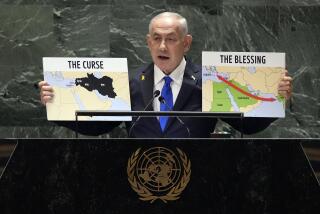Mubarak Assails Israeli Handling of Protests, Urges Peace Talks
- Share via
DALLAS — President Hosni Mubarak of Egypt lashed out at the Israeli government Saturday, calling the treatment of Palestinian demonstrators in the occupied territories a “travesty” and chiding the Israelis for their continued refusal to take part in an internationally sponsored Middle East peace conference.
Mubarak, in Dallas on the last day of his American visit, grew emotional as he discussed Israel’s refusal to participate in an international conference that Arab nations and others see as the way to settle the Palestinian question and resolve the unrest in the occupied West Bank and Gaza Strip.
The Egyptian leader was especially critical of Israeli Prime Minister Yitzhak Shamir, who has steadfastly refused to consider any peace initiatives other than those outlined in the 1978 Camp David accords, which led to the Israeli-Egyptian peace treaty.
“Why do they (the Israelis) fear the conference? That is the question,” Mubarak asked rhetorically. “Why do they fear this? They are not going to impose a solution on the participants.
“The only person refusing the international conference is Prime Minister Shamir,” he said.
Mubarak, whose country is the only Arab nation with diplomatic ties to Israel, told the Dallas and Ft. Worth Councils on World Affairs that the time had come for negotiating a peaceful solution to the Palestinian question.
“We are simply saying that other formulas have been tried unsuccessfully,” he said. “Therefore, there is no reason why we should block progress and waste precious time. We are at the 11th hour.”
He said that Jordan and Syria, both Israeli neighbors, would only negotiate in the forum of an international conference.
Mubarak, who took office after the assassination of Anwar Sadat in 1981, made public a five-point peace plan when he arrived in the United States last Wednesday. Among the provisions was a six-month truce in the West Bank and Gaza confrontations, coupled with a six-month ban on the construction of any more Jewish settlements in the occupied territories.
While President Reagan, in welcoming Mubarak, said the Palestinian problem should not be allowed to “fester,” little outward progress is evident toward reinvigorating the Middle East peace process.
In his speech, Mubarak briefly touched on the topic of Islamic fundamentalism, a growing movement in Egypt and other Middle East countries. Mubarak attributed the rise in fundamentalism to increased violence in the region, as well as to the Middle East’s acute economic problems.
During that portion of the speech, a man in the audience shouted a fundamentalist slogan that was often heard during the U.S.-Iranian hostage crisis. Mubarak ignored the remark.
Mubarak reiterated his call for an end to the Iran-Iraq War and said that another of his major concerns is the beleaguered Egyptian economy. Egypt, the Arab world’s most populous country, has a $44-billion foreign debt, and the Egyptian leader said he will be working to relieve that burden with an increase in production and exports.
More to Read
Sign up for Essential California
The most important California stories and recommendations in your inbox every morning.
You may occasionally receive promotional content from the Los Angeles Times.













